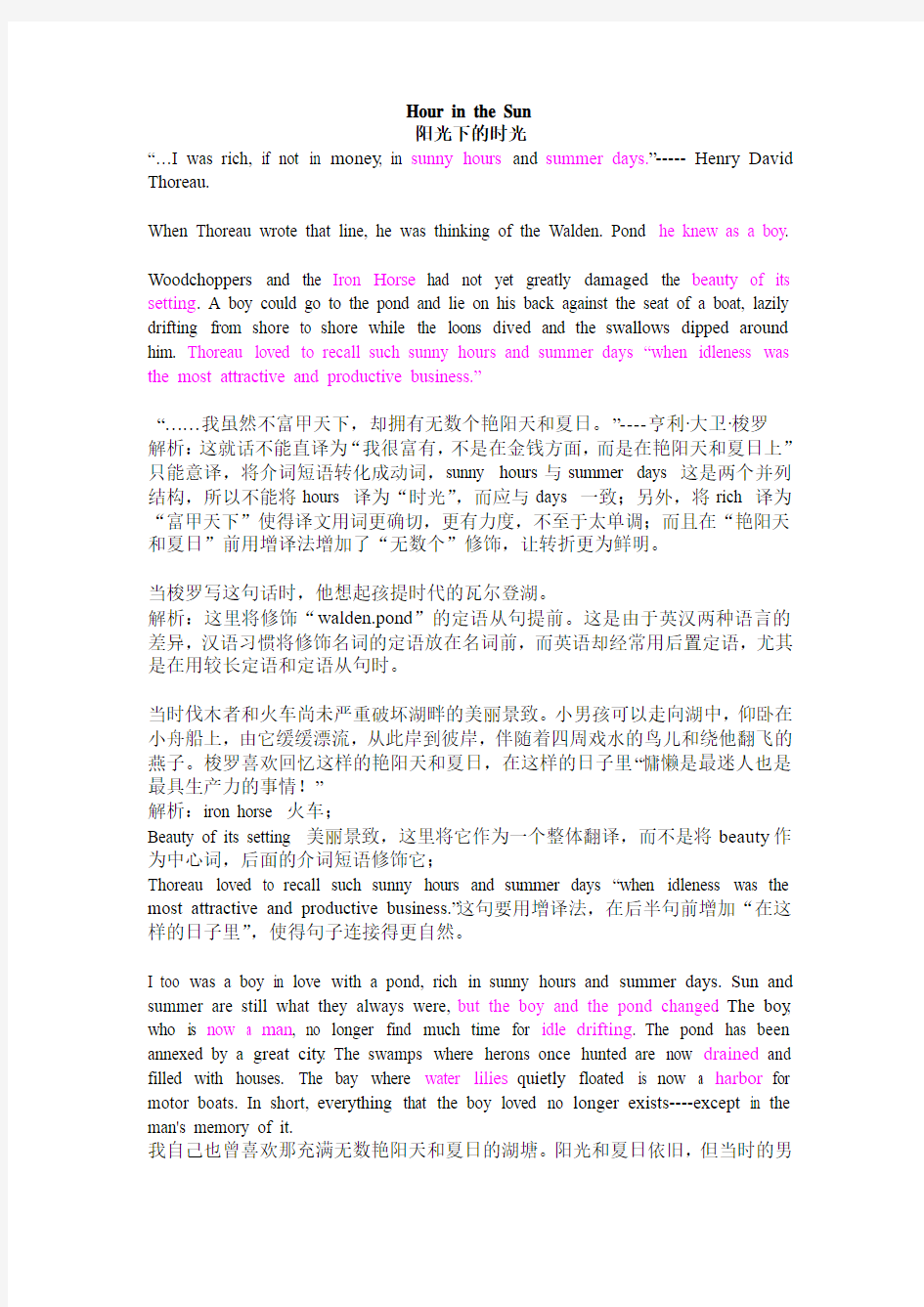短文翻译与解析

- 1、下载文档前请自行甄别文档内容的完整性,平台不提供额外的编辑、内容补充、找答案等附加服务。
- 2、"仅部分预览"的文档,不可在线预览部分如存在完整性等问题,可反馈申请退款(可完整预览的文档不适用该条件!)。
- 3、如文档侵犯您的权益,请联系客服反馈,我们会尽快为您处理(人工客服工作时间:9:00-18:30)。
Hour in the Sun
阳光下的时光
“…I was rich, if not in money, in sunny hours and summer days.”----- Henry David Thoreau.
When Thoreau wrote that line, he was thinking of the Walden. Pond he knew as a boy.
Woodchoppers and the Iron Horse had not yet greatly damaged the beauty of its setting. A boy could go to the pond and lie on his back against the seat of a boat, lazily drifting from shore to shore while the loons dived and the swallows dipped around him. Thoreau loved to recall such sunny hours and summer days “when idleness was the most attractive and productive business.”
“……我虽然不富甲天下,却拥有无数个艳阳天和夏日。”----亨利·大卫·梭罗
解析:这就话不能直译为“我很富有,不是在金钱方面,而是在艳阳天和夏日上”只能意译,将介词短语转化成动词,sunny hours与summer days 这是两个并列结构,所以不能将hours 译为“时光”,而应与days 一致;另外,将rich 译为“富甲天下”使得译文用词更确切,更有力度,不至于太单调;而且在“艳阳天和夏日”前用增译法增加了“无数个”修饰,让转折更为鲜明。
当梭罗写这句话时,他想起孩提时代的瓦尔登湖。
解析:这里将修饰“walden.pond”的定语从句提前。这是由于英汉两种语言的差异,汉语习惯将修饰名词的定语放在名词前,而英语却经常用后置定语,尤其是在用较长定语和定语从句时。
当时伐木者和火车尚未严重破坏湖畔的美丽景致。小男孩可以走向湖中,仰卧在小舟船上,由它缓缓漂流,从此岸到彼岸,伴随着四周戏水的鸟儿和绕他翻飞的燕子。梭罗喜欢回忆这样的艳阳天和夏日,在这样的日子里“慵懒是最迷人也是最具生产力的事情!”
解析:iron horse 火车;
Beauty of its setting 美丽景致,这里将它作为一个整体翻译,而不是将beauty作为中心词,后面的介词短语修饰它;
Thoreau loved to recall such sunny hours and summer days “when idleness was the most attractive and productive business.”这句要用增译法,在后半句前增加“在这样的日子里”,使得句子连接得更自然。
I too was a boy in love with a pond, rich in sunny hours and summer days. Sun and summer are still what they always were, but the boy and the pond changed. The boy, who is now a man, no longer find much time for idle drifting. The pond has been annexed by a great city. The swamps where herons once hunted are now drained and filled with houses. The bay where water lilies quietly floated is now a harbor for motor boats. In short, everything that the boy loved no longer exists----except in the man's memory of it.
我自己也曾喜欢那充满无数艳阳天和夏日的湖塘。阳光和夏日依旧,但当时的男
孩和湖塘却已改变。那男孩已长大成人,不再有那么多时间泛舟湖上了,湖塘也为大城市吞并了。曾有苍鹭觅食的沼泽已枯竭殆尽,上面布满了房子。曾有睡莲静静漂浮其上的湖湾现在也成了汽艇的避风港。总之,男孩所爱的一切已不复存在----只留在人们的回忆中。
解析:but the boy and the pond,这里用增译法,根据上下文,添加“当时的”使整个译文更缜密;
the boy, who is now a man用词类转译法,将名词译作动词,译为“长大成人”,这里也用以实化虚的方法,让译文不至于太呆板;
idle drifting 也用词类转译的方法,将名词转化为动词,这也符合英汉两种语言在用词方面的差异:英语常用名词,而汉语常用动词;
drained:干涸,这里用四字格“枯竭殆尽”,使得程度更深,并且带有感情色彩; bay本意为“海湾”,这里根据上下文——整篇文章讲的是瓦尔登湖,所以将它译为“湖湾”;
water lilies 睡莲
Some people insist that only today and tomorrow matter. But how much poorer we would be if we really lived by that rule! So much of what we do today is frivolous and futile and soon forgotten. So much of what we hope to do tomorrow never happens.
The past is the bank in which we store our most valuable possession: the memories that give meaning and depth to our lives.
有些人坚持认为只有今日和明日才是重要的,可是如果真的照此生活,我们将是何其可怜!我们今日做的许多事都是徒劳不足取的,而且很快就会被忘记,而我们期待明天要做的许多事却从来没有发生过。
解析:frivolous and futile 两个形容词意思相近,可将它们放在一起翻译,译成“徒劳不足取的”;
这两句联系紧密,可以合成一句,用增译法给它加个转折词“而”,使得衔接自然;
在这段翻译中,我们组的肖苏华认为这里的“today and tomorrow”应该用“以实化虚”的方法将它译为“现在和未来”,所以整段译为
“有些人坚持认为只有现在和未来才是重要的,可是如果真的照此生活,我们将是何其可怜!我们现在做的许多事都是徒劳不足取的,而且很快就会被忘记,而许多我们期待未来要做的事却从来没有发生过。”不过尚未被其他人认可。
过去是一所银行,它珍藏着我们最珍贵的财富——那些给我们的生活增添意义和深度的记忆。
解析:这句用了拆分法,将定语从句拆成一个独立的分句,以免造成译文头轻脚重。
Those who truly treasure the past will not bemoan the passing of the good old days, because days enshrined in memory are never lost. Death itself is powerless to still a remembered voice or erase a remembered smile. And for one boy who is now a man, there is a pond which neither time nor tide can change, where he can still spend a
